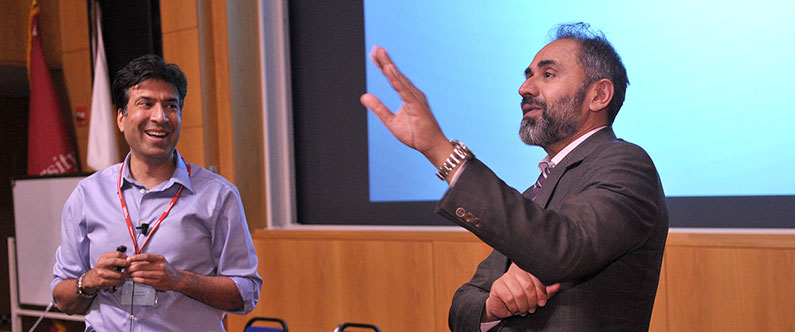WCM-Q diabetes conference goes from strength to strength
 WCM-Q’s Dr. Rayaz Malik, right, and visiting diabetes expert Dr. Syed Abbas Raza, quiz participants on the material they learned at the conference.
WCM-Q’s Dr. Rayaz Malik, right, and visiting diabetes expert Dr. Syed Abbas Raza, quiz participants on the material they learned at the conference.
WCM-Q has hosted its third successful International Diabetes Excellence Academy (IDEA) conference, welcoming around 40 doctors locally and from Pakistan to the college to learn about the latest approaches for diagnosing and managing patients with diabetes.
The two-day IDEA conference featured lectures and debates led by expert speakers, plus Q&A sessions on a wide variety of topics, such as new diagnostic methods for neuropathy and ischaemic heart disease, dietary and pharmacological recommendations, insulin treatment, diabetes and stroke, diabetic foot and managing diabetes in pregnancy, among others.
WCM-Q’s Division of Continuing Professional Development coordinated the IDEA conference in partnership with Dr. Rayaz Malik, WCM-Q Professor of Medicine, Dr. Syed Abbas Raza, Consultant Diabetologist/Endocrinologist at Shaukat Khanum Cancer Hospital and Research Center and the National Hospital in Lahore, Pakistan, and Dr. Hamed Farooqi, Director of the Diabetes Centre in Dubai.
If diagnosed early and managed carefully, diabetes patients can lead normal lives, but poor management of the disease increases the likelihood of serious complications such as premature blindness, renal failure and amputation, as well as death caused by myocardial infarction or stroke. The World Health Organization estimates that by 2030 almost 14 million people in Pakistan will have diabetes, up from just over five million in 2000. This will create a major problem in terms of providing adequate treatment for all these extra patients, in a country with already limited resources.
Dr. Raza said: “Currently the data shows that in Pakistan we are among the top 15 countries in the world in terms of the prevalence of diabetes. However, newer data suggests that the true prevalence may actually be even higher and we may be among the top ten, which is extremely concerning.
“The IDEA conference is important because doctors in Pakistan may not have access to the latest information about how to treat diabetes and its complications. Through IDEA we can give these doctors that information to help them provide the best possible treatment for their patients. The response to IDEA has been so positive that we are running it twice a year now to meet demand.”

Dr. Shahzad Alam Khan practices in the city of Multan in the Punjab region of Pakistan. He said: “We have been given a vast amount of information in two days and the event has been quite excellent. I have been practicing for seven years and I have seen the prevalence of diabetes increase hugely - it is reaching the level of an epidemic. Unfortunately, in Pakistan we do not have the latest medicines or the information about treatment that we need. Our set-up for dealing with diabetes requires a lot of improvement and this event has shown us some ways we can achieve that.”
Dr. Malik said: “Helping doctors to diagnose diabetes early and manage it successfully in the long-term is very important because the complications of the disease can be extremely debilitating, which is particularly problematic if the affected person is the sole breadwinner in their family. We are very encouraged that so many doctors were able to visit WCM-Q from Pakistan to learn the latest information they need to treat their diabetes patients most effectively.”